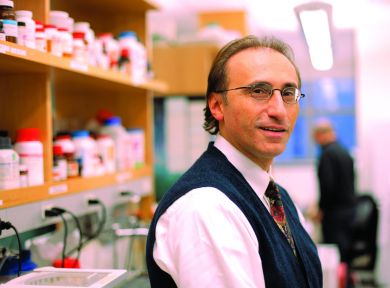Stem cell therapy research gets $15.7m boost
A consortium of scientists and transplant clinicians from the Ansary Stem Cell Institute at Weill Cornell Medical College and the Center for Cell Engineering at Memorial Sloan Kettering Cancer Center has been awarded a $15.7 million, four-year research grant from the New York State Stem Cell Science Program (NYSTEM) to translate their innovative approach to expand and manipulate hematopoietic stem cells to cure acquired and inherited blood disorders.
For many patients with such blood diseases, including sickle cell disease, the only hope for curing them requires transplanting normal blood stem cells. However, in many instances, suitable normal blood stem cells cannot be found or there are insufficient numbers of cells for transplantation. The consortium seeks to address this critical need with an innovative system to expand stem cells outside the body using specialized blood vessel cells — known as a vascular niche — to support and nurture the stem cells as they do inside the body.
The consortium will conduct two clinical trials using this platform to expand hematopoietic stem cells. The first trial uses the vascular niche to expand umbilical cord blood stem cells for transplantation in patients with blood cancers that cannot be cured by chemotherapy or available donors. The second trial aims to correct the genetic abnormality in blood stem cells from patients with sickle cell anemia and then return these cells to the patients to supply healthy, functioning stem cells. If successful, the techniques may provide safer, more broadly available stem cell transplants to many thousands of patients affected by blood disorders.
"This innovative approach marries Weill Cornell Medical College's stem cell expansion capabilities with Memorial Sloan Kettering's robust cell engineering and gene-transfer techniques," said Principal Investigator Shahin Rafii, M.D., director of Ansary Stem Cell Institute and a professor of medicine, genetic medicine and reproductive medicine at Weill Cornell.
"We are indebted to our NYSTEM partners for their support, because this award offers the opportunity for new curative therapies for patients with blood malignancies and sickle cell disease," said co-Principal Investigator Joseph Scandura, M.D., who is a hematopoietic stem cell physician-scientist and scientific director of the Richard T. Silver, M.D. Myeloproliferative Neoplasm Center at Weill Cornell. Dr. Scandura is also an assistant professor of clinical medicine at Weill Cornell.
Sickle cell disease is caused by a mutation in the oxygen-carrying protein hemoglobin that distorts the size and shape of red blood cells, causing them to clump together and stick to blood vessel walls, cutting off blood and oxygen supply to vital organs. Despite the need, there are no FDA-approved techniques to expand blood-forming stem cells to cure this disease, and any patients who do not receive transplants of normal blood stem cells, either because genetically matched stem cells are not available or because transplanting the cells from another person, risks life-threatening complications.
"The expansion of blood-forming stem cells is a critical advance for the successful implementation of a number of genetic therapies based on gene addition or gene correction," said Principal Investigator Dr. Michel Sadelain at MSK, a leader in T cell and stem cell engineering. "Our combined expertise in stem cell expansion and globin gene therapy for thalassemia is a strong foundation for developing a potentially curative therapy for sickle cell disease," he said, referring to a blood disorder in which the body makes an abnormal hemoglobin.
Consortium scientists expect that the vascular niche platform will generate large numbers of patients' own blood-forming stem cells, enabling a genetic modification of their stem cells and avoiding the risks of transplanting cells from another person. These two trials will require manufacturing of clinical grade human blood vessel, or endothelial cells, for intravenous infusion for "first in man" clinical trials.
The NYSTEM consortium grant supports a collaborative effort led by Principal Investigators Drs. Rafii and Scandura at the Ansary Stem Cell Institute at Weill Cornell and Drs. Sadelain and Isabelle Rivière at MSK. The group, led by Drs. Rafii and Scandura, is joined by co-investigators Drs. Jason Butler, Todd Evans and Koji Shido at the Ansary Stem Cell Institute to complete comprehensive pre-clinical studies in accordance with U.S. Food and Drug Administration guidelines. The team led by Drs. Sadelain and Rivière brings significant expertise with stem-cell engineering and clinical translation of innovative cell therapies. Drs. Juliet Barker, Sergio Giralt and Farid Boulad will lead the phase I clinical trials at MSK that are expected to start within the next two to three years.



